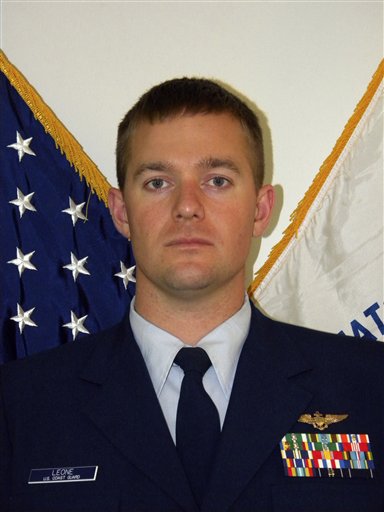By Becky Bohrer
The Associated Press
JUNEAU, Alaska — The U.S. Coast Guard today dismissed negligent homicide and other charges against the sole survivor of a 2010 helicopter crash off LaPush.
The decision in the case of Lt. Lance Leone was in line with the recommendations of an investigating officer, who oversaw a three-day military hearing in December.
Leone was the co-pilot of the MH-60 Jayhawk helicopter flying from Astoria, Ore., to the crew’s base in Sitka, Alaska, when it snagged electrical wires across the mouth of the Quillayute River and crashed in July 2010.
Leone, upon hearing the news at work, “started cheering and was extremely happy for this long-awaited day,” his attorney, John Smith, told The Associated Press.
Leone also said he needed to tell his wife, who is expecting the couple’s third child.
Leone was charged with negligent homicide, dereliction of duty and destruction of government property stemming from the crash, which killed pilot Sean Krueger, of Connecticut, and crewmen Brett Banks, of Wyoming, and Adam C. Hoke, of Montana.
The negligent homicide charges were related to Banks and Hoke.
The decision to charge Leone stunned Leone’s family and friends, as well as some relatives of the victims.
Leone, who has earned a long list of Coast Guard awards and accolades, was the sole survivor. He had recovered from his injuries and been cleared for flight retraining when he was charged last year.
The charge sheet alleged that Leone failed to properly navigate the helicopter to avoid charted hazards and that he negligently failed to ensure it was flying at a higher altitude. It also alleges that he did “without proper authority, through neglect, destroy by causing the crash of CG-6017,” an aircraft valued at $18.3 million.
Leone was accused of not actively navigating or challenging Krueger’s decision to drop in altitude seconds before the helicopter hit the 1,900-foot span of wires and crashed.
The wires, which were the site of at least two other accidents, were the responsibility of the Coast Guard, and sloped from 190 feet to about 36 feet.
At the time of the 2010 crash, marking balls were pooled near a pole, above land at the low point, not along the span. The helicopter hit at about 114 feet, according to testimony and the court record.
One of the prosecutors, Cmdr. Matthew Fay, said there was no requirement the lines be marked because they were below 200 feet. The crash’s lead investigator called the lines a contributing factor but said there was no reason for the aircraft to be flying so low.
Smith said in December that Leone programmed the helicopter on a track that would have missed the wires, but Krueger deviated from that, dropping in altitude as he flew over a Coast Guard vessel in the channel.
Seconds later, the aircraft struck the wires.
The lawyer called it a “costly human error,” caused by “the trap” set by the Coast Guard.
In January, the investigating officer who presided over the three-day military hearing, Capt. Andrew Norris, recommended the charges be dismissed.
He said he didn’t conclude that Leone was faultless but said the charges focus on alleged navigational failures by Leone and tie those to the destruction of a helicopter and death of two crew members.
“It is in this focus, and in making this tie, that I believe the charged offenses fail,” he wrote.
Norris also investigated whether Leone was derelict in his duty for not advising Krueger that they were flying too low at certain points in the flight and recommending a rise in altitude. The allegation arose from the hearing, and prosecutors said they didn’t seek it.
Norris said he believed there were “reasonable grounds” to believe that Leone had “committed the crime of negligent dereliction of duty” for not questioning or speaking up about the altitude.
But he said proving that required speculation as to what Krueger may have done if Leone had spoken up, and he said he did not believe the government could prove this link “to a reasonable fact-finder.”
Norris said he didn’t believe disciplinary action was warranted in that instance but said it could be addressed through training and other “non-punitive measures.”
Rear Adm. Thomas Ostebo was not bound by Norris’ recommendations.
Smith said the Coast Guard must close its original investigation into the crash, which could result in administrative actions.
He said Leone, whose duties since being charged have included working as a safety officer, is in line for a promotion in the coming months, and his defense team is working to get him flight retraining and a new assignment.
Smith said that “after an ordeal like this, one needs a fresh start, and when an officer is given that fresh start, he is expected to perform as any other officer would.”
